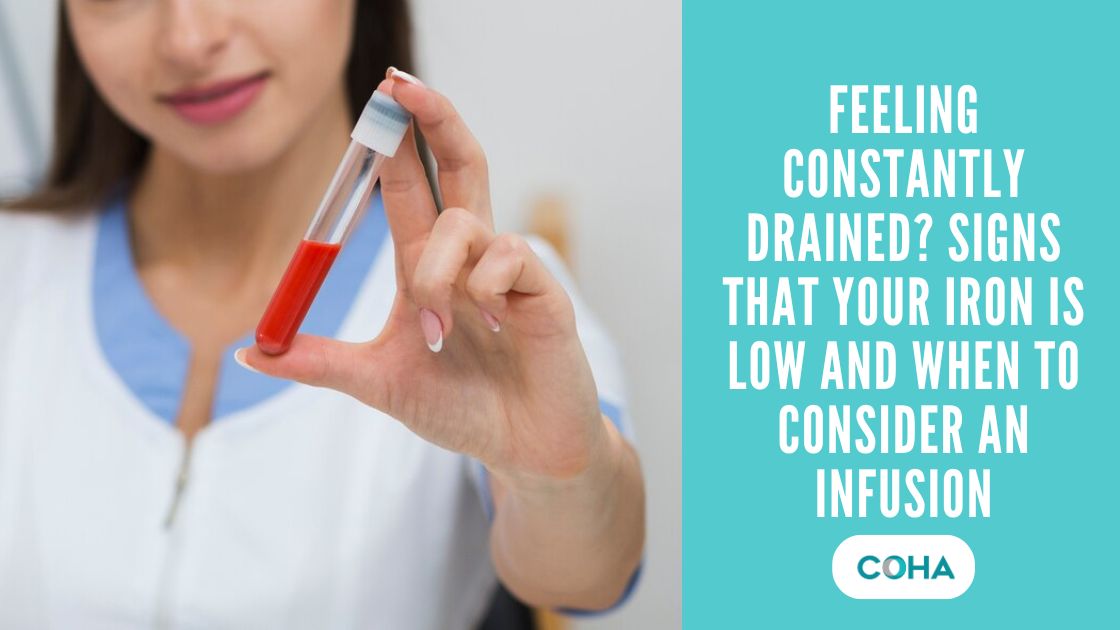Do you often feel tired, lightheaded, or out of breath even after a full night’s rest? These could be signs that your iron is low. Iron plays a crucial role in transporting oxygen through the bloodstream, and when levels drop too low, it can lead to iron deficiency anemia - a condition that affects your energy levels, cognitive function, and overall health.
While mild cases of low iron in the body can be corrected with diet and supplements, some people struggle to absorb iron properly, making an iron infusion a necessary treatment option. In this guide, we’ll explore the effects of low iron, how to recognize symptoms early, and when to consider an iron infusion for fast recovery.
What Does Iron Do in the Body?
Iron is essential for red blood cell production, helping transport oxygen throughout the body. Without enough iron, the body struggles to produce hemoglobin, leading to fatigue, weakness, and other health complications.
- Boosts Energy Levels – Iron ensures muscles and tissues receive enough oxygen to function properly.
- Supports Brain Function – Low iron levels can affect memory, concentration, and cognitive performance.
- Strengthens the Immune System – Iron helps the body fight infections and recover faster.
When iron levels drop significantly, the body struggles to function efficiently, leading to persistent fatigue and health complications.
Common Signs That Your Iron Is Low
If you're wondering whether you have low iron levels, here are some key symptoms to watch for:
- Unexplained Fatigue – Feeling constantly drained, even after a good night's sleep.
- Dizziness and Lightheadedness – Frequent dizzy spells or difficulty standing up quickly.
- Pale Skin and Brittle Nails – A lack of iron reduces oxygen-rich blood, leading to paleness and weak nails.
- Shortness of Breath – Low iron levels make it harder for the body to transport oxygen, making exercise and daily activities exhausting.
- Frequent Headaches – Poor oxygen supply to the brain can cause persistent headaches or migraines.
- Cold Hands and Feet – Poor circulation due to low iron in the body can leave extremities feeling icy cold.
- Cravings for Non-Food Items (Pica) – Some people with iron deficiency develop unusual cravings for ice, clay, or dirt.
Ignoring these symptoms can lead to more serious health issues, so early detection and treatment are crucial.
Effects of Low Iron in the Body
When left untreated, low iron levels can have severe consequences for long-term health:
- Cognitive Impairment – Lack of iron affects focus, memory, and mental clarity and has been linked to conditions like ADHD.
- Weakened Immune System – Frequent colds, infections, and slow healing can indicate low iron.
- Heart Strain – The heart must work harder to pump oxygen-poor blood, increasing the risk of heart palpitations, irregular heartbeat, and even heart failure in severe cases.
If these symptoms persist despite dietary changes or supplements, medical intervention may be needed.
When to Consider an Iron Infusion?
For some individuals, dietary iron and oral supplements are not enough to correct iron deficiency. Iron infusions are a faster, more effective treatment for severe deficiency. You may need an iron infusion if:
- Oral supplements aren't working – Some people don’t absorb iron well from food or pills.
- You have severe iron deficiency anemia – Extremely low iron levels may require immediate replenishment.
- Digestive issues prevent absorption – Conditions like Crohn’s disease, celiac disease, or gastric bypass surgery can cause malabsorption.
- You experience heavy menstrual bleeding or chronic blood loss – If excessive blood loss is depleting your iron stores, an infusion can help restore levels quickly and effectively.
What to Expect from an Iron Infusion?
If you’ve been recommended an iron infusion, here’s what you can expect:
- Procedure – Iron is delivered intravenously (IV) in a medical setting under professional supervision.
- Time Commitment – Infusions can take anywhere from 30 minutes to a few hours, depending on the dose.
- Side Effects – Some patients experience mild flu-like symptoms, a metallic taste in the mouth, or slight fatigue after the treatment.
- Results – Many patients notice increased energy levels within a few weeks after treatment.
Iron infusions are safe and effective, providing a faster recovery compared to oral supplements.
Conclusion
If you're feeling constantly fatigued, dizzy, or struggling with shortness of breath, these could be signs that your iron is low. Low iron levels can have serious health effects, but the good news is that treatment is available.
Don’t Let Low Iron Drain Your Energy
At Chesapeake Oncology-Hematology Associates, we specialize in diagnosing and treating iron deficiency anemia, offering iron infusions for those who need a rapid and effective solution.
Don’t let low iron hold you back. Contact us to schedule a consultation today and take the first step toward restoring your energy and well-being!


